Each year on July 25, urban and rural groups, progressives and conservatives, and people near and far all come together to celebrate the Colorado River. As the hardest working river in the West, it's up to us to work together to protect the future of the water- and while the river has seen some hard times, the future is looking bright. On this day in 1921, Congress voted to change the name of the river from "Grand" to "Colorado." But while the name change doesn't necessarily affect the river, many other changes have. As the West had continued to expand, the river serves as an economic engine for the entire country. The river supports 16 million jobs, generates $1.4 trillion in economic benefits, and supplies drinking water for 38 million people across seven states and two countries.
Apart from the economic benefits, the river supports an abundance of recreational activities. The river is home to 30 native fish species, two-thirds of which are threatened or endangered, and over 350 bird species.
 The mighty river also irrigates more than 1.8 million acres of land- producing about 15 percent of the nation’s crops and about 13 percent of livestock. These totals generate about $1.5 billion a year in agricultural benefits.
The mighty river also irrigates more than 1.8 million acres of land- producing about 15 percent of the nation’s crops and about 13 percent of livestock. These totals generate about $1.5 billion a year in agricultural benefits.
It's easy to see how the river may be overused and while it still faces serious hardships, some say the best days of the Colorado River are right now.
In the headwaters of the Colorado, a Learning by Doing initiative is underway to ensure that the health of the river and it's tributaries remain at the forefront even with additional diversion structures. Through Learning by Doing, the water is constantly monitored for temperature, riparian vegetation, and aquatic macro-invertebrates. If there is a problem detected, the appropriate measures will be implemented to make sure the water quality and trout habitat is preserved.
“The so-called “Learning by Doing” program sets up a collaborative process that requires water users to monitor the health of the river in coming years and adjust operations to address unforeseen challenges and opportunities," said David Nickum, Executive Director of Colorado Trout Unlimited.
 Another project in place to keep the Colorado River healthy is the Windy Gap Bypass. Issues with the reservoir's placement have put a stretch of river between Granby and Kremmling is jeopardy. But steps are being taken to bring the river back to health. A plan to bypass the reservoir and reconnect the river's natural flow is underway. “We wouldn’t be at this point without the leadership of Grand County and their persistent efforts to improve the health of the Colorado River,” said Kirk Klancke, president of TU’s Colorado River Headwaters chapter. “And the Northern subdistrict also deserves credit for listening to our concerns and working with all stakeholders to find solutions.”
Another project in place to keep the Colorado River healthy is the Windy Gap Bypass. Issues with the reservoir's placement have put a stretch of river between Granby and Kremmling is jeopardy. But steps are being taken to bring the river back to health. A plan to bypass the reservoir and reconnect the river's natural flow is underway. “We wouldn’t be at this point without the leadership of Grand County and their persistent efforts to improve the health of the Colorado River,” said Kirk Klancke, president of TU’s Colorado River Headwaters chapter. “And the Northern subdistrict also deserves credit for listening to our concerns and working with all stakeholders to find solutions.”
The river also saw a major victory when the Colorado Department of Public Health released a final 401 permit that affirms the health of the Colorado through the Windy Gap Firming Project. “This long-term monitoring and flexibility of response use is called ‘adaptive management’—and it’s a critical feature of the permit requirements,” said Mely Whiting, counsel for Trout Unlimited. “Adaptive management recognizes that stakeholders can’t foresee every problem, and it provides a process for ongoing monitoring and mitigation of river problems as they arise.”
 While further on down from the headwaters, Trout Unlimited is teaming up with ranchers and cattlemen to use water more efficiently and responsibly. "Continued development of the reservoir storage system is necessary, too, but ranchers need to realize their role and the opportunities they have to manage their water in a way that protects agricultures’s viability," said T. Wright Dickinson, former president of the Colorado Cattlemen’s Association.
While further on down from the headwaters, Trout Unlimited is teaming up with ranchers and cattlemen to use water more efficiently and responsibly. "Continued development of the reservoir storage system is necessary, too, but ranchers need to realize their role and the opportunities they have to manage their water in a way that protects agricultures’s viability," said T. Wright Dickinson, former president of the Colorado Cattlemen’s Association.
Down river, more awareness is being spread about safe water usage in dessert climates like Nevada and Arizona. And thanks to strong El Nino winter, a lot of California reservoirs were full this spring for the first time in years.
While the river provides life the west, the west is starting to supply like to the river. Through projects at the headwaters down to where the Colorado meets the Pacific, steps are being taken to ensure that the health of the river remains at the forefront for everybody who calls the west home.










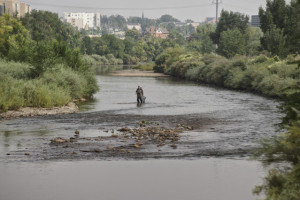 As the Denver Metro area continues to grow, the water needs rise with it and the unreliable flows from the South Platte River aren't enough to supply roughly 80% of the state's population with water throughout the year. Which is why water from the Upper Colorado River headwaters- in this case the Fraser River- are diverted for Front Range usage.
As the Denver Metro area continues to grow, the water needs rise with it and the unreliable flows from the South Platte River aren't enough to supply roughly 80% of the state's population with water throughout the year. Which is why water from the Upper Colorado River headwaters- in this case the Fraser River- are diverted for Front Range usage.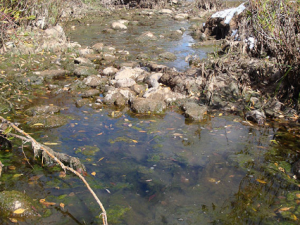 Learning by Doing requires regular monitoring of stream temperature, riparian vegetation, and aquatic macro-invertebrates. If an environmental problem is detected, Denver Water will provide some financial support and additional flows to help solve the issue. This includes providing the flushing flows the river needs in the spring to clean sediment build up.
Learning by Doing requires regular monitoring of stream temperature, riparian vegetation, and aquatic macro-invertebrates. If an environmental problem is detected, Denver Water will provide some financial support and additional flows to help solve the issue. This includes providing the flushing flows the river needs in the spring to clean sediment build up.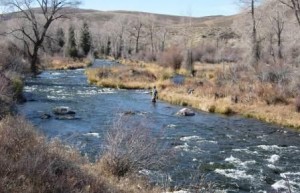 "This project strikes a necessary balance between the water needs of Front Range municipalities and the need to protect healthy flows and fish and wildlife habitat in the Fraser River," said David Nickum, Executive Director of Colorado TU. "The so-called “Learning by Doing” program in the proposal sets up a collaborative process that requires water users to monitor the health of the river in coming years and adjust operations to address unforeseen challenges and opportunities. Moreover, Denver Water has entered into partnerships on the Front Range to ensure that the project alleviates chronic low-flow problems in South Boulder Creek. Both sides of the Divide benefit.”
"This project strikes a necessary balance between the water needs of Front Range municipalities and the need to protect healthy flows and fish and wildlife habitat in the Fraser River," said David Nickum, Executive Director of Colorado TU. "The so-called “Learning by Doing” program in the proposal sets up a collaborative process that requires water users to monitor the health of the river in coming years and adjust operations to address unforeseen challenges and opportunities. Moreover, Denver Water has entered into partnerships on the Front Range to ensure that the project alleviates chronic low-flow problems in South Boulder Creek. Both sides of the Divide benefit.”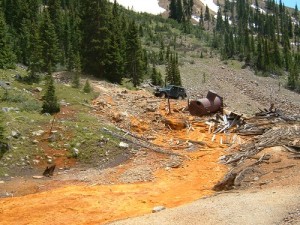 The estimated costs to clean up these sites range from $32-72 billion. Trout Unlimited initiated our Western Abandoned Hard Rock Mine Restoration Program in 2004 to both clean up problem mine sites that impact streams and fisheries, and to draw attention to the challenges associated with these efforts. From our innovative mine tailings revegetation projects addressing toxic mine tailings in Colorado to our successful floodplain restoration projects in Montana, Trout Unlimited has earned national recognition as the leading practitioner of Good Samaritan abandoned mine restoration in the country.
The estimated costs to clean up these sites range from $32-72 billion. Trout Unlimited initiated our Western Abandoned Hard Rock Mine Restoration Program in 2004 to both clean up problem mine sites that impact streams and fisheries, and to draw attention to the challenges associated with these efforts. From our innovative mine tailings revegetation projects addressing toxic mine tailings in Colorado to our successful floodplain restoration projects in Montana, Trout Unlimited has earned national recognition as the leading practitioner of Good Samaritan abandoned mine restoration in the country.
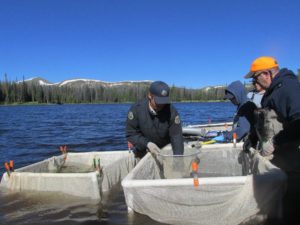


 Groups all over the state worked together to protect our state's water quality and our trout's quality of life. CTU hired water quality expert, Ashley Rust, as a consultant to provide technical support. Her work demonstrated flaws in the data selection and analysis used for the WQCD’s proposal. TU also worked with Colorado Parks and Wildlife scientists along with other organizations including Sierra Club, Colorado Wildlife Federation, CPW and EPA.
Groups all over the state worked together to protect our state's water quality and our trout's quality of life. CTU hired water quality expert, Ashley Rust, as a consultant to provide technical support. Her work demonstrated flaws in the data selection and analysis used for the WQCD’s proposal. TU also worked with Colorado Parks and Wildlife scientists along with other organizations including Sierra Club, Colorado Wildlife Federation, CPW and EPA.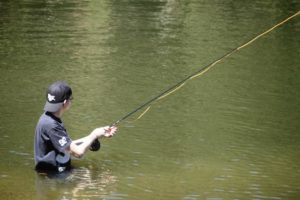 "Big thanks to John Woodling, who's testimony was a turning point in the hearing," said Whiting. "To Robin (Knox) who in 5 minutes conveyed a lifetime of experience- I loved the example of all the poor fish huddling in a small pool in the Yampa to avoid the hot water in response to the Division's callous assertion that if it's too hot, fish can just swim away. Big thanks to Dennis Buechler, who very softly and meekly brought in the impacts of these decisions on small businesses."
"Big thanks to John Woodling, who's testimony was a turning point in the hearing," said Whiting. "To Robin (Knox) who in 5 minutes conveyed a lifetime of experience- I loved the example of all the poor fish huddling in a small pool in the Yampa to avoid the hot water in response to the Division's callous assertion that if it's too hot, fish can just swim away. Big thanks to Dennis Buechler, who very softly and meekly brought in the impacts of these decisions on small businesses." Colorado River float trip: a full day float trip for two on the "lower Upper" Colorado River, above Dotsero. This float trip is with Jack Bombardier and Confluence Casting, who lives alongside the river and loves to share his "home waters" with new and returning visitors. Jack will take you on the Colorado River as it flows through one of the most colorful and beautiful canyons anywhere. On a typical float you might see bighorn sheep, eagles, dinosaur tracks, waterfalls and course lots of feisty trout. Best of all, since this section sees very little river traffic,there a good chance you 'll have it to yourselves! Learn more at the
Colorado River float trip: a full day float trip for two on the "lower Upper" Colorado River, above Dotsero. This float trip is with Jack Bombardier and Confluence Casting, who lives alongside the river and loves to share his "home waters" with new and returning visitors. Jack will take you on the Colorado River as it flows through one of the most colorful and beautiful canyons anywhere. On a typical float you might see bighorn sheep, eagles, dinosaur tracks, waterfalls and course lots of feisty trout. Best of all, since this section sees very little river traffic,there a good chance you 'll have it to yourselves! Learn more at the  Upper Gunnison River walk/wade trip: a full day walk/wade trip for two on public water in the upper Gunnison basin, operating from Three Rivers Resort in Almont with Willowfly Anglers, in the heart of one of Colorado's great fishing meccas picking up world-class angling options with the Gunnison, East, and Taylor Rivers. Operating for over 30 years, Willowfly offers experienced fly fishing guides, excellent private water options (available for an additional fee), as well as a full service fly fishing shop. Willowfly Anglers is the only Orvis Endorsed Outfitter in the Almont area and was recently named one of the top five Orvis Endorsed Outfitters in North America. Learn more at the
Upper Gunnison River walk/wade trip: a full day walk/wade trip for two on public water in the upper Gunnison basin, operating from Three Rivers Resort in Almont with Willowfly Anglers, in the heart of one of Colorado's great fishing meccas picking up world-class angling options with the Gunnison, East, and Taylor Rivers. Operating for over 30 years, Willowfly offers experienced fly fishing guides, excellent private water options (available for an additional fee), as well as a full service fly fishing shop. Willowfly Anglers is the only Orvis Endorsed Outfitter in the Almont area and was recently named one of the top five Orvis Endorsed Outfitters in North America. Learn more at the 
